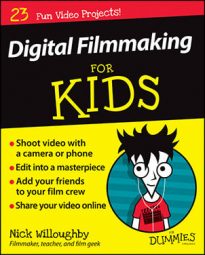Has anyone ever told you “you are your own worst critic”? This means that sometimes you spot mistakes or problems in your digital film that others wouldn’t notice. Seeing these otherwise‐invisible flaws is a common ailment in the creative arts.
In fact, you may find your finished film hard to watch because you’ll notice all those mistakes or things you could have done better. This is fine, but try not to be too hard on yourself or too negative about your work when you do notice mistakes. Keep in mind that you’ll only get better as a filmmaker. Some of your first films may be full of mistakes and problems, but you can look back and see how much you improve over time.
After you have made your film, it’s important to write down the things you learned through making it and the things you want to change the next time you make a film. The sooner after making your film that you do this, the better. By moving quickly, the process will still be fresh in your mind. Then you can start applying these changes to your next film.
When reviewing films, ask yourself the following questions:
Did the final edited film turn out as I expected? Why or why not? Here you make notes on how you feel about the final result of your film. Is it what you had in mind when you created the idea? Think about what is different to the original idea and in what ways the film did or didn’t turn out as you expected. This is important to answer.
If it didn’t turn out the way you expected, you need to figure out why that is. Was it because of the scripting or storyboarding process? Or did changes happen during filming? Maybe your film turned out better than expected and nothing needs to change.
What would I change about the story? This is where you can comment on the story. Sometimes the story ideas that work in our heads turn out different when acted out in a film. Did the story work? Did it make sense? Is there something missing? Do the characters work well with the story? Think about what you would change if you were to write the story again.
What would I change about the way the film looks? Here you can make notes on the way the film was shot and how the footage looked in the final edit. Sometimes the footage can look one way during the shooting and another when imported to your computer. This usually comes down to the fact that you’re looking at a small screen when filming and a larger screen when editing, and the larger screen magnifies everything.
You may not have noticed during filming that the subject was out of focus or the lens on your camera was dirty or that the boom appeared in the shot. By making notes on these things, though, you will learn from these mistakes and take more time checking your shots when filming your next project.
You may also want to make notes about the various shots you used when filming. Do they help tell the story? Do they help to build emotions or so they distract the audience? Could you have spent more time getting the right shot or getting an extra angle? All these notes can help to make your next film look even better.
What would I change about the process I used to make the film? This is where you can review how the filming process went and if there is anything you would change. Were there any issues with locations or props? What was it like working with the actors and crew? Did the filming go according to plan? Did you try and fit too much into one day? Did the weather affect the filming schedule? What went well?
Some things, like the weather, are not possible to control, but it’s good to note down all the challenges. Remember to include what you would change when filming your next project. You may decide to have a backup plan if the weather is bad and film a different scene instead. You may aim to film less in a day or may run more rehearsals for your actors to help them develop their character and learn their lines. Don’t worry if you have listed many things to change; this just helps make the filming process even better next time.
What did I enjoy most about making this film? This is a good opportunity to write down all the things you enjoyed about making your film from start to finish. What part of the process did you enjoy the most? Why did you enjoy making this film? What role did you enjoy within the team? What was your favorite moment? Thinking about what you enjoyed the most will help remind you why you love being a filmmaker.
Remember to be positive when reviewing your film and think about all the good things about it. Being too negative about your film could cause you to lose confidence and may put you off doing another film. Keep the review notes you make on your film and use them to develop the next project you work on.

